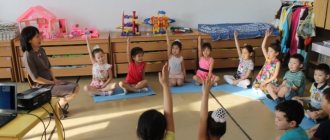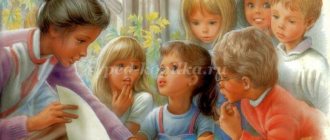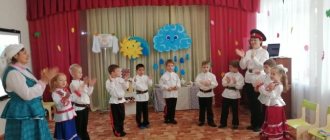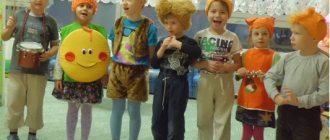Arkady Gaidar. "Hike"
While Alka was sleeping, his father went to war. The boy is outraged that they didn’t wake him up. He is about to leave after his father. Alka's cunning mother unexpectedly allows him to go on a hike, but with one condition. You need to be properly prepared for a difficult road. And now she and Alka are learning marches, sewing banners, knitting stockings and mittens... Before reading this story to the little listener, it is worth mentioning that Arkady Gaidar never returned from his military campaign.
2.
Leonid Panteleev. "My heart is in pain"
A short story by Leonid Panteleev raises adult questions about grief and the loss of loved ones in war. But it can and should be read to children. The hero of the story is hiding from the mother of his deceased childhood friend. “The feeling of some kind of awkwardness and guilt that I returned, and Petka died, does not leave me all evening... My heart claws painfully: I see in my mind the whole of Russia, where in every second or third family someone did not return...”
3.
Sergey Alekseev. "General Zhukov"
From an early age, children need to be introduced to the names of the glorious heroes and commanders of the Great Patriotic War. The work of Sergei Alekseev fulfills this task very well. Georgy Konstantinovich Zhukov is a man on whose shoulders lay a heavy burden of responsibility for the entire army and for every soldier’s life. This means that he always had to be half a step ahead of even his subordinates, not to mention his enemies. This is the story.
6.
Tips for parents
There is practically not a single family in Russia that has not been affected by the war. Some had grandfathers, great-grandfathers, grandmothers and great-grandmothers who fought, others worked in the rear to provide the Soviet army with everything it needed at the front. In those distant and difficult years, there was practically not a single person indifferent to the fate of our Motherland. You need to talk to a preschooler about the war in simple, understandable and accessible language. It will be difficult for a small child to reconsider a large amount of information, so you should not try to tell him everything about the war at once. For example, it is better to talk about military equipment and weapons after visiting the museum, when the child can see everything with his own eyes. You can talk to your child about the heroism and valor of soldiers at the monument or in the military glory park. You can talk about the heroic deeds of the soldiers and gratitude for the peaceful sky during creative drawing classes and when preparing crafts for Victory Day.
If there were or are still alive front-line soldiers in your family, or if one of your relatives worked in the rear during the war, be sure to tell your child about them. If possible, let the child himself communicate with eyewitnesses of that time, learn about the difficult life, the terrible lot that befell their cries. Show your child the awards that your relative was awarded and share with him your memories of that time. Such conversations will remain in the child’s memory for a long time.
Reading relevant literature will also have a positive effect on the formation of a correct and clear civic position of a preschooler. Parents can take their child to the library and together choose books about exploits, battles, blockades, and generals of the Great Patriotic War, focusing on the child’s age. On a day off, you can visit a museum with your whole family or go on a trip to some hero city and see local military attractions. When laying flowers at monuments of military glory, tell your child the purpose for which this is being done, and honor the memory of the fallen with a minute of silence. The kid should know that they all defended the Motherland (and him too) from fascism.
Alena Vasilevich. "Partisan Book"
Not only people took part in the Great Patriotic War. The book is a cavalryman's horse. In one of the battles she was wounded in the leg. The owner did not raise his hand to shoot his fighting friend, and he left the Book in a small village, in the care of an elderly collective farmer. Soon the village was occupied by the Nazis, and a partisan detachment appeared in the surrounding forests. And then the Book came into operation again. She served the partisans faithfully, and once, thanks to her, a downed Soviet pilot was saved.
7.
Conversation dedicated to the Great Patriotic War in a preschool group of 5-6 years old
DEPARTMENT OF EDUCATION ADMINISTRATION
KLIN CITY DISTRICT
MUNICIPAL PRESCHOOL EDUCATIONAL INSTITUTION –
COMBINED KINDERGARTEN No. 2 “KALINKA”
_______________________________________________________________________________
141612, Moscow region, Klin, st. K. Marksa, 96 "A", tel. 8 (49624) 2-02-16
Conversation dedicated to the Great Patriotic War
in preschool group 5 – 6 years old
Topic: “The main thing is not to forget!”
Performed:
teacher Lvova T.G.
Klin, 2020
Target:
nurturing patriotic feelings in children through reference to the heroic past of our country.
Tasks:
- Educational:
— Expand children’s understanding of the heroic past of the people;
— To develop in preschoolers patriotic qualities and a sense of involvement in the history of the Fatherland;
— Encourage respect for the feat of our soldiers;
— Expand children’s horizons and ability to empathize with other people.
- Educational:
— Develop skills in speech and productive activities using patriotic material;
— To develop imagination, observation, and curiosity in preschoolers.
- Educational:
— Foster respect for veterans of the Great Patriotic War;
— To cultivate a sense of patriotism, respect for the history of our people, for the child heroes of the Great Patriotic War;
— To foster the desire of children to fight for peace.
Preliminary work:
- Conversation “The exploits of young heroes.”
- Examination of illustrations about the Great Patriotic War.
- Reading stories and poems about the war.
- Listening to fragments of musical works in audio recordings M. Isakovsky, M. Blanter “Katyusha”; N. Solovyova, Mr. Struve “My Russia”; V. Lebedev - Kumach, A. Alexandrov “Holy War”.
- Learning poems and songs about the Great Patriotic War and Victory Day.
Dictionary:
Great Patriotic War, Motherland, front, feat, hero, Victory Day.
Hello guys!
Victory Day is “joy with tears in our eyes,” the poet said. And indeed, on this day joy and sorrow are nearby. There is no family in Russia that was spared by the war. Therefore, on this day, every family remembers those who remained on the battlefields and those who established a peaceful life after the war. They also congratulate the soldiers of the Great Patriotic War who are alive today, and there are fewer and fewer of them. It was they who stood to the last - defending their Motherland. They stood and survived.
Many years ago, an unknown soldier died, And the children live and grow, They bring flowers to the obelisk. Thank you, dear soldier, for protecting everyone that spring. How long has your mother been waiting for you, Tired of cursing the war. We are glad for the warmth and spring, But we remember the terrible war, So let us be friends and love, Just to be happy!
Those who went into battle for their homeland, survived and won.
To those who forever, nameless, sank into fascist captivity.
Our lesson is dedicated to all those who went into immortality and won.
This year our people will celebrate the 75th anniversary of the Great Victory. On this day, both joy and sorrow are nearby. Joy comes from victory, sorrow and sadness come from the memories of those who died on the battlefields.
In the early morning of June 22, 1941, our homeland was attacked by the enemy, Nazi Germany. At 4 o'clock in the morning, when people were fast asleep, the Great Patriotic War began. Announcements and calls to rise to defend the Motherland began to be heard on the radio.
The entire people rose up to fight the fascists. The enemies were rushing towards Moscow with all their might, dreaming of capturing the capital - the very heart of our Motherland - as soon as possible.
This is a difficult and hungry time for the people of our country. It was difficult for all the people, but it was especially difficult for children. Many were left orphans. Children came face to face with the cruel, merciless, evil force of fascism. They often fled to the front.
Over the long years of war, our soldiers accomplished many feats and heroic deeds. Our soldiers were distinguished by extraordinary courage.
What is a “feat”? A feat is a valiant action that is important for many people; a heroic act performed under difficult conditions. Brave warriors defended their homeland on land, at sea, and in the air.
Physical education minute
Our warriors go one-two, one-two, (walking in place)
They beat the drums loudly: tra-ta-ta, tra-ta-ta (“we represent a drum with our hands, as if we were knocking on a drum)
Our ships are at sea: here today, there tomorrow! (“rocking chair”, hands on the belt, feet shoulder-width apart, swinging, waddling from foot to foot)
We swam for a long time in the distance across the seas, on the waves! (circular movements with hands)
Border guard at the post: who's coming? who goes? (feet shoulder-width apart, make turns to the sides)
Tanks are driving across the bridge: forward, forward, forward! (“motor” we make circular movements with our hands in front of us)
An airplane above the ground: ooh, ooh! (arms to the sides, perform bends)
Missiles are allowed to take off: Ooh, ooh! (squat, palms folded in front
chest, stand up and raise their arms up)
Our guns hit exactly: bang, bang! Bang, bang! ("boxing")
Salute to our army! (raise hands up)
Hooray! Hooray! Hooray!
The battle with the Nazis lasted a long time - it was the Great Patriotic War. It was called that because the whole people stood up to defend the Motherland. Even women and young men went to the front.
And those who could not go to the front (children, old people, sick people) worked in factories, producing cars, tanks, weapons, and shells necessary to protect the country. Children also helped adults in factories and fields.
Many soldiers did not return from that war. But we will always remember them. Every city has a monument to soldiers who died in the Great Patriotic War. And people always bring fresh flowers to their feet.
Today, I will tell you guys about how children lived, endured all the hardships and helped adults. One such child was our fellow countryman, Misha Balakirev.
The story “Pioneer Hero - Misha Balakirev”
Misha Balakirev was born and grew up in our city, studied at a railway school. When the war began, Misha was 13 years old. He just finished 5th grade. In the winter of 1941, German troops approached Klin very close, and the Balakirev family moved to live in the village of Zolino.
One day Misha and two comrades fled to the city and there he accidentally saw how the Nazis shot six of our soldiers. It happened on the banks of the Sestra River.
That day Misha decided to take revenge on the Nazis. Wherever he could, by any means, he tried to get weapons. His friends and his older sister Shura helped him in this.
But one day Misha left home and did not return for a long time. On this day he managed to get a pistol from a German car.
The Nazis noticed this and grabbed Misha. They asked him for a long time why he needed weapons. But Misha didn’t tell them anything. Then he was severely beaten. Late at night he was taken out into the street and shot there.
Misha was buried in Klin, where the Eternal Flame burns.
A street in Klin is named after Misha Balakirev.
In Pervomaisky Square there is a monument to the mass grave of Soviet soldiers, and there is also an obelisk dedicated to Misha Balakirev.
I hope that this conversation will become a real example of courage and courage for you. And remember that even a “little” person can become a real hero. Thanks to the fact that both adults and children stood up to fight the enemies, our people won this war, and on May 9 our country celebrates the Great Holiday - Victory Day. Guys, I think that on this day you and your parents will lay flowers at the monuments of fallen soldiers. After all, today you learned what trials they had to go through in the name of this bright day - Victory Day!
I wish you peace and clear skies above your head!
Nikolay Bogdanov. "Fynfkinder"
This story is valuable because it was written during the Great Patriotic War, when its outcome was still unknown. Finding himself captured by the partisans, the shot down German, in order to save himself from immediate execution, shows a photograph of his five children. Despite their hatred of the fascists, the partisans let him live. And he settles into “the fabulous housing of the partisans - either a stilt village from the Stone Age, or a nesting ground for wading birds.” This story clearly reveals one of the best features of the Russian people, who have always been able to distinguish “the guilty from the innocent.”
8.
How to tell children about war? List of books about war for children of different ages
Books help us preserve the memory of the war and its heroes. It is necessary to introduce children to such works from early school age. Before you start reading books about the war, it is worth talking with your child about history, presenting the main facts in an accessible form, telling them that soldiers defended their homes and their relatives from cruel invaders, while showing courage and heroism. You can also talk about how difficult life was for the women and children whose husbands, brothers and fathers went to the front, but they persevered through all the trials.
In Svetlana Alexievich’s famous book “War Doesn’t Have a Woman’s Face” there is a very important and deep thought: “If you don’t forget the war, a lot of hatred appears. And if a war is forgotten, a new one begins.” This year our country will celebrate the 70th anniversary of Victory in the Great Patriotic War. This tragedy claimed millions of human lives, destroyed cities and entire countries, and broke countless destinies. This is the price that humanity had to pay to get rid of the horrors of fascism. Soviet soldiers defended peace and won freedom for their country, for you and me. This should never be forgotten, no matter how much time passes.
For preschoolers and primary schoolchildren, poems about war :
- Barto A. In the days of war
- Berestov V. Man
- Karprov I. Boys
- Mikhalkov S. Children's shoe, Ten-year-old man
- Marshak S. “Not” and “neither” and many others
For preschoolers and primary schoolchildren, poems about war :
- Barto A. In the days of war
- Berestov V. Man
- Karprov I. Boys
- Mikhalkov S. Children's shoe, Ten-year-old man
- Marshak S. “Not” and “neither” and many others
List of books about war for preschool and primary school age
- Voronkova L. Girl from the city (A story about an orphan girl who found herself in a foreign village during the war and found a new family and home.)
- Kassil L. Street of the Youngest Son (A story dedicated to the tragic fate of Volodya Dubinin, a young partisan - hero of the Great Patriotic War.)
- Kataev V. Son of the Regiment (The story of the orphan boy Vanya Solntsev, who ended up in a military unit with intelligence officers and became the son of the regiment.)
- Oseeva V. A. Vasek Trubachev and his comrades (A work about the fate of the boy Vasya Trubachev and his friends, whose peaceful childhood was cut short by the war.)
- Simonov K. The artilleryman's son (The ballad about Major Deev and Lenka, the son of his friend, based on real events.)
- Yakovlev Yu. Girls from Vasilievsky Island (A poignant story about the girl Tanya Savicheva, who died along with her entire family from starvation in besieged Leningrad, written based on her diary.)
And:
- Alekseev S. Stories about the Great Patriotic War
- Artyukhova N. Svetlana
- Baruzdin S. A soldier walked down the street
- Voronkova L. Girl from the city
- Gaidar A. Timur's Oath, The Tale of the Military Secret, about Malchish-Kibalchish and his firm word
- Golyavkin V. Drawing on asphalt
- Dragunsky V. Arbuzny Lane
- Kassil L. My dear boys, Flammable cargo, Your defenders
- Markusha A. I am a soldier, and you are a soldier
- Paustovsky K. The adventures of the rhinoceros beetle
- Sokolovsky A. Valery Volkov
- Suvorina E. Vitya Korobkov
- Turichin I. Extreme case
- Yakovlev Yu. How Seryozha went to war
Middle schoolchildren will enjoy learning about children, their peers, during the Great Patriotic War, their lives, deeds and exploits.
List of books about war for students in grades 5–7
- Bogomolov V. Ivan (Tragic and true story about a brave boy scout.)
- Kozlov V. Vitka from Chapaevskaya Street (The book tells about the fate of teenagers during the war.)
- Korolkov Yu. Pioneers-heroes. Lenya Golikov (A story about a young pioneer from the Novgorod region Lena Golikov, his fate and feat, based on real events.)
- Rudny V. Children of Captain Granin (The story of the young defenders of the Gulf of Finland, who were able not only not to let the enemy pass, but also took fire on themselves at the most decisive moment.)
- Sobolev A. Quiet Fast (The story of the courage and heroism of yesterday's schoolchildren during the Great Patriotic War.)
And:
- Alekseev S. Stories about war
- Balter B. Goodbye, boys!
- Bogomolov V. Zosya
- Ilyina E. Fourth height
- Likhanov A. The last cold weather
- Mityaev A. Letter from the front
List of books about war for students in grades 8–9
- Adamovich A. Siege book (Documentary chronicle, which is based on the testimonies of Leningraders who survived the siege.)
- Aitmatov Ch. Early Cranes (A story about the destinies of teenagers during the Great Patriotic War, their lives in a distant Kyrgyz village, the trials and joys that befell them.)
- Baklanov G. Forever - nineteen years old (The story of the young lieutenants of the Great Patriotic War, their tragically short front-line journey.)
- Vasiliev B. And the dawns here are quiet... (A story about the tragic fates of five girls and their commander, performing a feat during the war.)
- Polevoy B. The Tale of a Real Man (The Tale of the Soviet pilot Meresyev, who was shot down in battle and was seriously wounded, but again, in spite of everything, returned to combat formation.)
- Tvardovsky A. Vasily Terkin (A deeply truthful and humorous poem in which the immortal image of a Soviet soldier is created.)
- Sholokhov M. The Fate of a Man (A story about the tragic fate of a common man, distorted by war, and strength of character, courage and compassion.)
High school students are already quite ready to learn about the most tragic pages of the Great Patriotic War. Reading such books can be combined with watching war films, both Soviet and modern.
List of books about war for students in grades 10–11
- Adamovich A. Punishers (The story of the events associated with the destruction of seven peaceful villages in occupied Belarus by the battalion of Hitler’s punisher Dirlewanger.)
- Bogomolov V. Moment of truth: In August forty-four (A fascinating novel about the work of counterintelligence officers during the Great Patriotic War, based on real events.)
- Vorobyov K. Killed near Moscow (The story, which became the first of the “lieutenant’s prose” genre, tells about the brutal battles near Moscow in the winter of 1941 and the fate of their participants.)
- Nekrasov V. In the trenches of Stalingrad (The story tells about the heroic defense of Stalingrad in 1942–1943.)
- Fadeev A. Young Guard (Novel about the Krasnodon underground organization "Young Guard", which operated in the territory occupied by the fascists, many of whose members died heroically in fascist dungeons.)
- Sholokhov M. They Fought for the Motherland (A novel about one of the most tragic moments of the war - the retreat of our troops to the Don in the summer of 1942.)
And:
- Bondarev Yu. Battalions ask for fire
- Medvedev D. Strong in spirit
- Smirnov S. Brest Fortress
In conclusion, I would like to note that reading books about war is not entertainment, it is serious work, intellectual and spiritual, in many ways complex and difficult, especially for children. However, it is impossible to do without this work, because, according to the words of Svetlana Alexievich, whom we have already mentioned, “human life is not endless, only memory can prolong it, which alone defeats time.”
Valentina Oseeva. "Father's Jacket"
When leaving for the front, the father passes on to his eldest son Lenka not only his black velvet jacket, but also responsibility for his mother and younger brothers and sisters. Lenka is only thirteen years old, but he is a small man. Valentina Oseeva, with piercing maternal love, describes the life of children of war, forced to replace adult front-line soldiers for the time being. Father's jacket is a symbol of an entire generation. Our great and tragic history.
9.
Why tell children about war?
One of the important stages in the development of a child’s personality is his comprehensive development and knowledge of the history of his country is simply mandatory. Preschool children are very inquisitive. But not all topics may be of interest to them, but only those that have practical significance. Of course, a teacher or teacher must be able to present the material correctly in order to interest even the most unmotivated children. Boys and girls perceive stories about the war somewhat differently: boys use the example of heroes to form a model of masculinity and courage, girls take care of loved ones and victims. Stories about the exploits and valor of the Soviet people contribute to the formation in children of a sense of pride in their people, country, the development of patriotism, love for the Motherland, and the desire to be like the heroes who defended our country.
Conducting thematic conversations and events in kindergartens is an important component of the patriotic education of preschoolers, the formation of love for the Fatherland, which helps to feel the roots of one’s family. That is why, the sooner a child begins to feel his involvement in the Motherland, in his native land, the sooner he will develop a sense of responsibility for its future, the future of his country, his family.
Parents should work closely with kindergarten teachers so that, with an integrated approach, they not only expand the child’s knowledge about the war of 1941-1945, but also form in him a correct and clear civic position, cultivate a respectful attitude towards the elderly and veterans, monuments and heroes of the Second World War.
Lev Kuzmin. "Fireworks in Strizhaty"
The long-awaited Victory Day has arrived. Residents of the small village of Strizhata are running to the station where the military train is stationed. Running along with everyone else is the main character - a young tractor driver who, throughout the war, lacking sleep and malnutrition, worked equally with adults. Residents of big cities will see festive fireworks on this great day. Will the residents of Stryzhat really be deprived of such an opportunity? The commander hands his rocket launcher into the hands of a small tractor driver. After all, this is his Victory! He brought her closer just like the soldiers at the front, with all his strength.
10.





